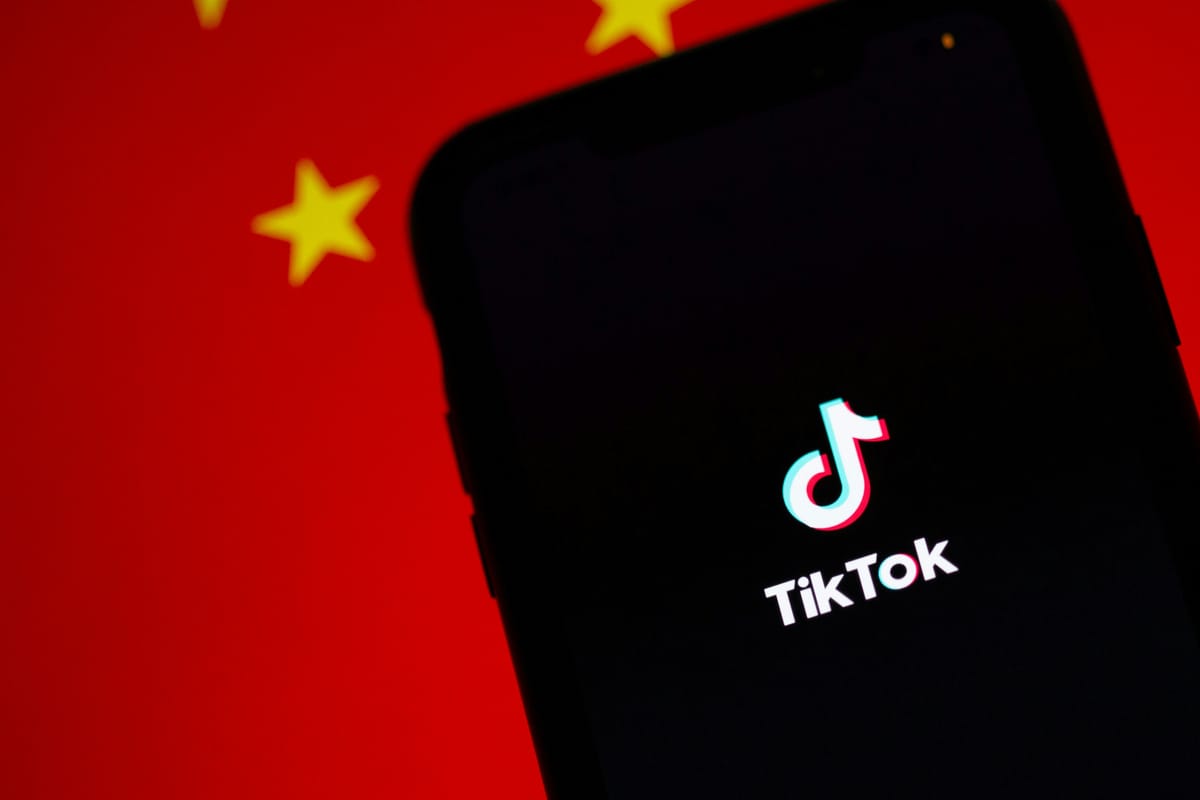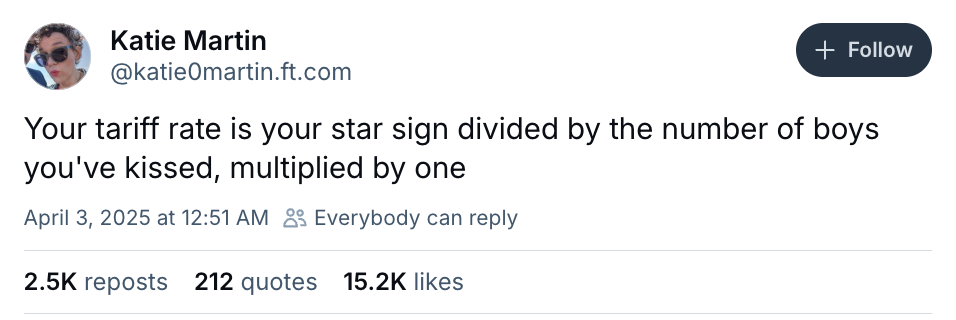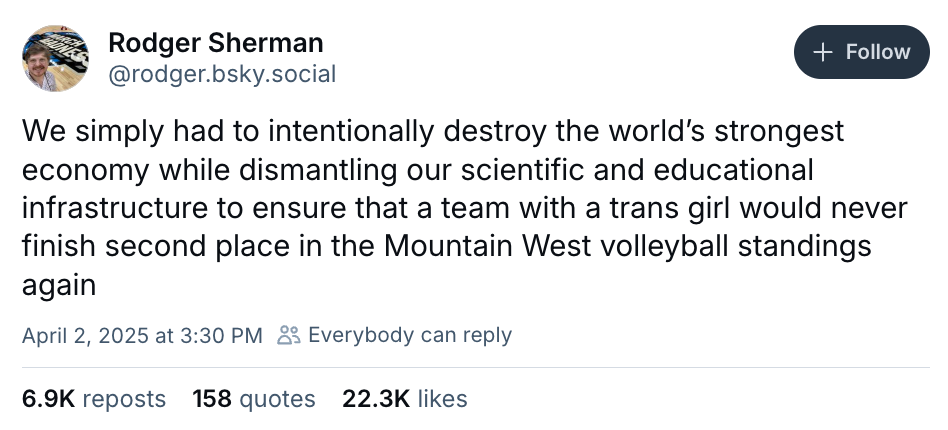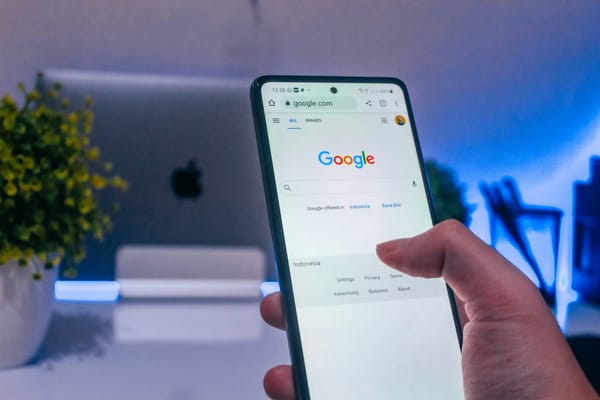TikTok’s fate could be decided by tariffs
Trump is holding out ByteDance's app as a bargaining chip. Will China take the bait?

On Wednesday, President Trump announced a sweeping set of tariffs affecting almost every American trade partner. A day later, the stock market had its worst day since the pandemic, and economists warned that Trump risked plunging the economy into recession. On the plus side, there is no plus side. This is all really happening, and for no good reason at all. Sorry about that.
The primary rationale given for Trump's tariffs is that they are meant to restore fairness in global trade — to prevent America's trade partners from taking advantage of it with tariffs of their own, creating trade deficits that the administration has positioned (flimsily) as a national emergency.
The second, more plausible rationale Trump has offered is that his tariffs are a negotiating tactic. While the Constitution designates the right to establish tariffs to Congress, Congress has passed a series of laws over the years delegating that authority to the president. In using that authority, Trump has already achieved a most pleasing (to Trump) outcome: every country in the world now must call and personally beg him for the favor of restoring the global economy to its formerly functional status.
One nice thing about Trump (sincerely) is that you rarely have to spend too much time wondering what his motives are, because before too long he will just tell you. On Thursday afternoon, asked by reporters about the reasoning behind his tariffs, he did just that.
Here's Annmarie Hordern in Bloomberg:
“The tariffs give us great power to negotiate,” Trump said, adding that “every country has called us.”
Asked if that meant he was considering relenting, Trump said it “depends.”
“If somebody said that we’re going to give you something that’s so phenomenal, as long as they’re giving us something that’s good,” Trump said.
What would be something "phenomenal" enough to win Trump's favor?
Once again, he just told us. From Bloomberg again:
He also reiterated that he would, in particular, be willing to offer tariff relief for China if Beijing approved the sale of the US operations of ByteDance Ltd.’s TikTok social video app. The service is facing a Saturday deadline for divestment, unless Trump offers an extension as part of his efforts to broker a deal.
Trump said they were “very close to a deal.”
One would hope so. On January 19, a law passed by Congress last year and signed into law by President Biden took effect that required ByteDance to divest itself of TikTok or else ban it in the United States. Trump took office the following day, and signed an executive order instructing the attorney general not to enforce the law for 75 days while he sought a buyer for the app.
This executive order appeared to be illegal on its face. The law, which was upheld unanimously by the Supreme Court, made no provision for the president to grant an extension. But as soon as it came into effect, seemingly no one wanted to enforce it — including the Biden administration, which called ByteDance's temporary shutdown of the app on January 20 an unnecessary "stunt."
Apple and Google, which kept TikTok out of their app stores for weeks in fear of the billions of dollars in fines the law told them they would be liable for, were eventually convinced that no one would actually enforce the law and allowed TikTok to return.
Trump's 75 day extension is up on Saturday, and the administration is promising a deal. “It’ll come out before the deadline,” Vice President J.D. Vance told Fox News. But given the chaos caused by the tariffs and the ongoing uncertainty about how a deal for TikTok would work, it seems likely that any agreement announced by Saturday would only be in principle.
Kaya Yurieff reported one possible shape for the deal on Wednesday in The Information:
Under Trump’s proposal, TikTok America would be roughly 50 percent owned by new U.S. investors and license TikTok’s algorithm from ByteDance, the person said. Existing investors in ByteDance would have a roughly one-third stake in the new company, while ByteDance would retain a 19.9 percent stake.
That structure would put ByteDance’s ownership just under the 20 percent threshold required in the U.S. law passed last year requiring TikTok to sever ties with its parent company or face a ban. With the new structure, Trump could deem a qualified divesture has happened under the law, which was passed by Congress last year and upheld by the Supreme Court.
There are three things to say about this possibility.
The first is that the identity of the winning consortium remains unknown. The Financial Times has reported that a group led by Oracle is the frontrunner, with Andreessen Horowitz in talks to join the bid. Amazon and AppLovin, which makes analytics software for mobile devices, are also reported to have made bids. And — why not — the founder of OnlyFans has organized a bid as well.
While anything could change, Trump has been looking for ways to gift TikTok to his ally and Oracle CEO Larry Ellison since his first administration, and it's hard for me to imagine him giving it to anyone else.
The second thing to say is that even if Trump announces he has picked Ellison by Saturday, there's almost no chance the deal will actually be done. There is no sign, for example, that China has yet agreed to a deal. And why would they, if Trump is openly telling them that TikTok can be a bargaining chip in easing tariffs?
"Instead," Yurieff reported today, "Trump is expected to give a deadline of up to 120 days from his announcement to finalize all the nuts and bolts of a deal."
And so, the most likely outcome of Trump's 75-day extension is a further 120-day extension.
The last thing to say about the deal as described is that it betrays everything Congress set out to do when it passed the law seeking the divestiture of TikTok last year. Congress was worried about two major issues: one, that Americans' data might be misused by the Chinese government, including for surveillance; and two, that TikTok's recommendation algorithms might be used as part of Chinese influence operations in the United States.
Perhaps the deal will include some as-yet unannounced provisions to address the data issue; absent that, ByteDance would retain a 19.9 percent stake in the app, and would almost certainly continue to use Americans' data just as it does today.
More importantly, ByteDance's algorithms — which members of Congress spoke of in near-mystical terms, terrified that (among other things) it might promote the spread of pro-Palestinian videos — would continue to fuel TikTok just as they always have. There is no evidence the Chinese government has used TikTok to spread propaganda, but licensing the app's algorithm to TikTok America would give them an avenue to do so.
Mind you, I'm not even saying I found these arguments by members of Congress particularly persuasive. But this was their rationale for passing a law, and it now appears as if they are poised to pretend as if they never did.
In any case, there was a time when the fate of TikTok, and the risks of foreign propaganda, loomed large in the minds of American policymakers. But we have bigger problems now. And the question for China is whether TikTok is important enough to Trump to persuade him to undo the damage that is only just beginning.
Elsewhere in TikTok: The company faces a $552 million fine for illegally transferring European Union users’ data to China. And here’s a profile of the man who could be TikTok’s next boss, 80-year-old Larry Ellison.


On the podcast this week: Tariffs! Then, the Wall Street Journal's Keach Hagey stops by to discuss the revelations in her new book about Sam Altman. And finally, we practice flirting with Tinder's new voice-based dating game.
Apple | Spotify | Stitcher | Amazon | Google | YouTube

Sponsored


Trump’s Tariffs
- Tech stocks plunged to its worst day since the Covid pandemic after Trump announced a range of new tariffs. Apple had one of the worst declines, dropping by more than 9 percent. (Samantha Subin / CNBC)
- Trump’s tariffs, which are set at 46 percent on Vietnam and 26 percent on India, will test Apple’s supply chain after it previously moved some production from China to the two countries. (Tripp Mickle / New York Times)
- De minimis tariff exemptions — the loophole for companies like Temu and Shein that allow packages worth under $800 from China and Hong Kong to enter the US tax free — will end on May 2. (Spencer Soper / Bloomberg)
- The US levied 54 percent tariffs on almost all Chinese products, the largest tariff hike ever, which experts say could decimate Chinese shipments to the US. (Bloomberg)
- The Bitcoin mining sector is facing pressure as the supply chain is based in Asia while many of the largest miners are based in the US. (Ryan Weeks / Bloomberg)
- The new tariff policies resemble a calculation that several major AI chatbots recommend, suggesting the Trump White House might have used them in its planning, an economist found. (Dominic Preston / The Verge)
- French government spokesperson Sophie Primas said France will prepare to retaliate against US tariffs with a new tax on “digital services” provided by Google, Amazon, Facebook, Apple and Microsoft. (Jacob Wulff Wold and Thomas Moller-Nielsen / Euractiv)

Governing
- Donald Trump has reportedly told members of his cabinet that Elon Musk will soon step back from his current governing partner role to take on a supporting one. (Rachael Bade / Politico)
- Mark Zuckerberg is reportedly lobbying Trump and other White House officials for a potential settlement that would prevent an FTC antitrust trial against Meta set for later this month. (Josh Dawsey, Rebecca Ballhaus and Dana Mattioli / Wall Street Journal)
- Zuckerberg was the mystery buyer of a $23 million mansion in Washington, DC. (Michael Schaffer / Politico)
- National security adviser Mike Waltz’s team reportedly sets up chats on Signal regularly to coordinate on issues including Ukraine, China, Gaza, Middle East policy, Africa and Europe. (Dasha Burns / Politico)
- Trump’s National Security Council members, including Michael Waltz, have used personal Gmail accounts for government business. (John Hudson / Washington Post)
- Oracle reportedly told its customers a hacker stole old client log-in credentials after breaking into a computer system, in the now second cybersecurity breach the company acknowledged to clients in the last month. (Jake Bleiberg / Bloomberg)
- The NLRB abruptly stopped two cases against Apple after Trump nominated Crystal Carey, Apple’s defense attorney in those cases, to be the board’s general counsel. (Michael Acton / Financial Times)
- EU regulators are reportedly preparing major penalties against X for breaking rules in the Digital Services Act designed to combat illicit content and disinformation. (Adam Satariano / New York Times)
- Musk’s X asked the Supreme Court to shield its users from law enforcement, filing a brief supporting a Coinbase user who claimed his privacy was violated after trading data was handed to the IRS. (Joe Miller and Hannah Murphy / Financial Times)
- Some parts of the Social Security website were inaccessible this week after the agency halted phone support and pushed retirees to seek help online. (Lucas Ropek / Gizmodo)
- A law professor here on a green card considers whether she needs to change her curriculum on free speech in the United States amid the ongoing crackdown on political dissent. (Evelyn Douek / The Atlantic)
- DDoS attacks, once used by petty criminals, are now becoming increasingly used as geopolitical weapons as new technology makes them more disruptive, a report found. (Ryan Gallagher / Bloomberg)
- YouTube has quietly updated its hate speech policy to remove the phrase “gender identity.” The company says its approach to enforcement has not changed. (Taylor Lorenz / User Mag)

Industry
- Some 130 million ChatGPT users have generated more than 700 million images since the upgraded feature’s debut in March, COO Brad Lightcap said. (Kyle Wiggers / TechCrunch)
- OpenAI is convening a group of experts to help “understand the most urgent and intractable problems” nonprofits face. The move appears to be a precursor to transferring billions to the nonprofit as part of a spinout of OpenAI's for-profit business. (Kyle Wiggers / TechCrunch)
- OpenAI and Andreessen Horowtiz led a $43 million funding round in AI cybersecurity company Adaptive Security, marking OpenAI’s first outside backing of a cybersecurity firm. (Laya Neelakandan / CNBC)
- Google is replacing head of Gemini AI Sissie Hsiao, who led the company’s creation of Gemini, with Josh Woodward, who oversaw the launch of NotebookLM. (Reed Albergotti / Semafor)
- NotebookLM now has a “discover sources” button that searches the web to find supporting material for users' projects. (Abner Li / 9to5Google)
- Google DeepMind outlined its approach to AGI safety as the systems become more powerful, focusing on the potential for misuse and misalignment. (Matthias Bastian / The Decoder)
- Google is reportedly in advanced talks to rent Nvidia’s servers, equipped with Blackwell chips, from CoreWeave. (Aaron Holmes, Stephanie Palazzolo and Anissa Gardizy / The Information)
- YouTube is adding five new tools to Shorts, including a revamped video editor with features like the ones on TikTok and Reels. (Jess Weatherbed / The Verge)
- Microsoft is reportedly pulling back on some data center projects globally, delaying development of sites in Indonesia, UK, Australia, and three states in the US. (Brody Ford, Dawn Lim, Olivia Solon and Faris Mokhtar / Bloomberg)
- Anthropic is launching a new Claude for Education tier, aimed at people in higher education. (Maxwell Zeff / TechCrunch)
- Grok is now increasingly being used on X for trolling in the form of “fact-checking.” (Katie Notopoulos / Business Insider)
- UFC struck a multi-million dollar, multi-year partnership deal with Meta, in a move bringing Mark Zuckerberg and UFC president Dana White closer. (Alex Sherman / CNBC)
- Roblox is introducing new parental tools that let parents have more control over who their children talk to and what experiences they can access. (Jay Peters / The Verge)
- Patreon is striking podcasting partnership deals with Sony Music and Amazon’s Wondery as it leans into the 35 percent growth it saw in podcasting revenue last year. (Ashley Carman / Bloomberg)
- Adobe is updating Premiere Pro with AI editing features, including one called Generative Extend that lets users extend clips by up to two seconds. (Jess Weatherbed / The Verge)
- A look at seven39, an experimental social media site that is only open for three hours a day. (Victoria Song / The Verge)

Those good posts
For more good posts every day, follow Casey’s Instagram stories.

(Link)

(Link)

(Link)

(Link)

Talk to us
Send us tips, comments, questions, and tariff loopholes: casey@platformer.news. Read our ethics policy here.





